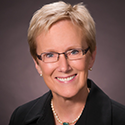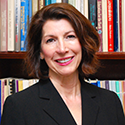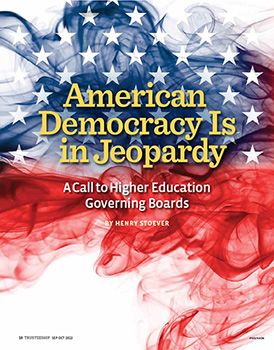
Opinions expressed in AGB podcasts are those of the speakers and not necessarily those of the organizations that employ them or of AGB.
Aired: November 3, 2022
A Call to Action for Governing Boards
Growing political intrusion into higher education, insufficient preparedness to address demographic shifts impacting campus communities, and public skepticism regarding the value of higher education have the potential to weaken our colleges and universities and severely limit their ability to serve our country and its strategic interests if left unaddressed. In his Trusteeship article, “American Democracy Is in Jeopardy,” former AGB President and CEO Henry Stoever calls on higher education governing boards to provide strategic leadership to address the threats to American democracy and our country’s economy.
In this podcast, former Trusteeship magazine editor-in-chief Carol Schuler talks with Stoever and AGB Senior Fellow and Senior Consultant Ellen Chaffee about what board members can do to become more educated, informed, and inspired to discuss and address these issues.
Click to Read the Podcast Transcript
Introduction (00:03):
Welcome to the Trusteeship podcast from AGB, the Association of Governing Boards. We cover everything higher education leaders need to know about the challenges facing our nation’s colleges and universities. More important, they provide the facts and insight you need to solve those challenges and to be the storytellers and advocates higher education needs.
Today, we’re talking about the state of American democracy. Growing political intrusion into higher education, insufficient preparedness to address demographic shifts impacting campus communities, and public skepticism regarding the value of higher education, have the potential to weaken our colleges and universities and severely limit their ability to serve our country’s strategic interests, if left unaddressed. In this podcast, Trusteeship magazine Editor‐in‐Chief Carol Schuler talks with AGB President and CEO Henry Stoever and AGB Senior Fellow and Senior Consultant Ellen Chaffee, about what board members can do to become more educated, informed, and inspired to discuss and address these issues.
Carol Schuler (01:10):
Hello. I’m Carol Schuler, the editor‐in‐chief of AGBs Trusteeship magazine. I’d like to welcome you today as well as my guests, Ellen and Henry. And I want to thank you both for joining me to discuss the article that you Henry wrote for the September/October issue of Trusteeship titled “American Democracy Is in Jeopardy.” You subtitled it, “A Call to Higher Education Governing Boards.” I’m happy that you’re here to discuss this really important topic with me. And I’d like to begin by just asking you, Henry, if you could please talk about why you wrote the article and why you wrote it now.
Henry Stoever (01:49):
Thanks, Carol, for inviting Ellen and me to participate in this important podcast. For our listeners, please know that I am passionate about higher education, the strategic value of governing boards and the future of our country. Importantly, the future of higher education and our country are inextricably linked by the important work of consequential strategic governing boards. Further, as Thomas Jefferson said, “The future of our nation’s democracy and our country is dependent upon a well‐informed citizenry. Therefore, regardless of a student’s major or field of study, students need to be prepared to be successful in civil discourse and to apply critical thinking into their lives and jobs. This ensures that they can thrive as members of their communities and contribute to the vitality of our economy and our democracy outcomes that are an important public good of what also is a private benefit.”
So, Carol, to answer your question, why did I write this article? There are three reasons on my mind. First, the future of institutions of higher education are dependent upon equitable student success. That means success for all students. Demographic changes in our country are changing the profile of college students. We need to carefully consider how we educate the students we serve today and will do so in the future. And also how we assess student outcomes. I believe that all people should afford all others to be treated with dignity and respect, and that’s something we cannot take for granted.
The second reason that I wrote the article is because the future of our country and its democracy is dependent upon a well‐educated citizenry that higher education is responsible for creating. We are in a time of change and boards must see their independence and governing authority to ensure our institutions are prepared to meet the needs of students so they can contribute to our economy and our democracy.
Equitable student success, a.k.a. student success for all students should be one of governing boards top priorities.
And the third reason, Carol, that I wrote the article was because as part of board’s efforts to oversee equitable students’ success, they in collaboration with their chief executives, staff, faculty, and other prioritized stakeholders across their living and learning communities should work to define student success within the context of institutional missions. They should also establish metrics including disaggregated data to measure student success that aligns with their definition of student success and they should assign responsibilities and expectations across campus. And lastly, they need to ensure that sufficient resources exist to support those who are responsible for driving student success outcomes.
Carol Schuler (05:13):
Thank you, Henry. Ellen, as a two‐time college president and an AGB consultant who currently works with governing boards, what was your reaction when you read Henry’s article?
Ellen Chaffee (05:27):
Carol and Henry, as an academic and an independent democracy activist, I am so relieved and grateful for Henry’s strong message at this time, especially. Both higher education and democracy are in an extremely vulnerable transition stages from what they were to what they will be. Boards and presidents cannot be on the sidelines, nor can AGB. Many boards today are suiting up for challenges, they focus on success for all students, become more engaged to create time for board discussion, and continually improve board effectiveness. They’re losing patience with transactional decisions and wanting to move on to substantive issues. The boards I’ve worked with have not yet discussed democracy, academic freedom, or civic education as critical new concerns. That can change. Over a decade ago, AGB focused attention on board oversight of educational quality and boards responded swiftly and well. Now, boards know that the times require them to be wise and strong enough to face major challenges.
Strengthening democracy is arguably the most urgent and existential of them all. Boards have a fiduciary responsibility to advance democracy. To be clear, we are referring to our republic, our form of government, not partisan politics. We can all talk about this even in divided times and we must. Citizen governance of education is one of the essential systems that make government of, by, and for the people possible, and boards are responsible for defending citizen governance of education. Unfortunately, some boards have proven quite vulnerable to political pressure. They may fear budget cuts otherwise, but it’s a short slippery slope to the kind of ideological demands we’re seeing now in several states. So, what can boards do? First, as Henry emphasizes so well, colleges and universities must do a much better more intentional job of producing educated citizens who value truth, evidence, rational thought, and democracy. This applies to every college, every university and every student.
Can the faculty integrate civic education intentionally across the curriculum and in co‐curricular activities? How could student research internships and volunteering at state or local government in election‐related activities contribute? Can the university host forums on and off campus for balanced discussion of controversial issues? Second, boards must also understand their personal and governance roles in supporting democracy, some of which are not for the faint of heart. For example, boards and presidents in several states face a game‐changing conundrum right now. How can they stand up for academic freedom for the very mission of their university without endangering their funding, their significant relationships, and their ability to fulfill their fiduciary responsibility? And what kind of future will their graduates have if they don’t?
Third, our institutions can also help repair what I call the democracy machine, the operating systems that transform the will of the people and their priorities into elected officials and public policy like systems for nominating, electing, proposing, influencing, deciding, balancing and holding accountable, for example. Our democracy systems have eroded and failed over the years. We can help. The new Karsh Institute of Democracy at UVA is inspiring. Could a university‐based democracy research center help amplify citizens voices in state and local government? Can school boards call on university resources for help in addressing anti‐democracy infringements? Education is the foundation of democracy and must be its first line of defense.
Carol Schuler (09:44):
Thank you, Ellen. You’ve made some really excellent points and I think where colleges play a vital role in their communities, you’ve pointed out some actions that they could take that would be very helpful. Henry, what steps can boards take to address these threats to democracy?
Henry Stoever (10:03):
Carol, it’s a great question. Easy for me to answer, hard for boards and board members to actually do. When I think about what is a potentially first step that boards can take to address the situation, the question I would ask is, how do we, (board members), know that they, (students) know what they (faculty) say that they (students) should know, and how do faculty know what they (employers) say that they (students) should know? It’s very easy to ask and it’s very hard to assess.
The second question I think about is, what we are doing to attract and enroll, retain and graduate more students, including traditionally aged adults and international students? I believe that enrolling more is the answer to our future, or you could say a higher percentage of high school graduates. Because as many people know, the number of children under the age of 18 in American households is declining.
When I think about the pipeline of future college students, colleges need to expand their apertures and accept more diverse, different kinds of students than in the past so that our country can favorably take advantage of well‐educated and well‐informed students to be participants in our society.
And the third question I think about is, in our own experiences, how have we integrated our professional work within our roles as a citizen? So what I mean by that is how have board members taken it upon themselves to utilize their personal experience, their professional experiences as members of their board, of their institution or institutionally related foundation to apply those experiences to their institution or foundation strategies, priorities, and practices so that their leadership team members can take advantage of them? The first point is to stand firm to protect in collaboration with your president and/or leadership team members and faculty to protect academic freedom and freedom of speech.
Those are absolutely critical pillars of higher education in America, and we need to defend them. Second one actually has a two‐part action steps. One is around empowering faculty to, a. develop students’ abilities to present, defend and question ideas from a broad range of perspectives. What I mean by that is that faculty, and this is Henry’s view, should make sure that when faculty are presenting ideas or teaching on a topic, they provide a broad range of issues and areas that some may appreciate and some may not appreciate. So that’s what I mean by a broad range of diverse perspectives so that students can work to understand the pros and cons, the pluses and minuses, and be able to develop critical thinking and engage in civil discourse, because I’m not saying that everybody’s going to agree with everything.
And the second part around empowering faculty is to ensure that students acquire the skills to think critically and creatively to work effectively with others. And I think from my perspective as the president of AGB, as an employer, that’s one of the aspects that we want our employees to do. We want our employees to engage in constructive dialogue so that we create better value for our members that include components that we may not have thought of initially. So, Carol, those are a couple of action items that I think boards and board members can take, but it starts with defending freedom of speech and freedom of expression, academic freedom, etc., so that when we welcome more students, more, well‐diverse students on campus, and hopefully retain more of them so that more of them graduate, those students graduate with the attributes that all employers, regardless of the employment that they (students) may engage in can favorably contribute to.
Carol Schuler (14:57):
Thank you, Henry, that was very helpful. This was an article that was just packed with ideas, so it’s helpful to have you unpack some of those. Ellen, what would you add to Henry’s point?
Ellen Chaffee (15:10):
I think boards could also review, take an overview of how their institution advances citizenship and democracy. I think they’d be surprised pleasantly by a number of things they do intrinsically, and that could be highlighted and reinforced. They could request a democracy‐risk assessment along the lines of the academic freedom challenges and potentially other campus culture items that might need to be addressed along the way, things like that. And certainly, a comprehensive improvement plan. They can address questions like these, are our graduates fully prepared to meaningfully participate in American democracy? What are the indicators? Hold ourselves accountable, can we improve? Do we, as trustee role models and as board policy makers exemplify our commitment to democracy? What are the indicators of that and how can we improve? Does our institution have expertise or opportunities to support fair accessible democracy systems, for example, in local or state government?
Are our policies on academic freedom and freedom of speech, clear, definitive, and well‐understood by trustees, faculty, staff, and students? Nothing prevents problems more strongly than shared expectations about what’s approved and what is within boundaries and how the institution implements its policies. Will we defend academic freedom even if doing so is likely to jeopardize important relationships with donors, funders, government leaders, and others? Having that conversation before it’s an issue could be very significant. Every board I’ve met with has powerful opportunities to benefit students in society by strengthening citizenship and democracy. I’m confident that all boards are up to the challenge and AGB will help. Right, Henry?
Henry Stoever (17:22):
Thank you, Ellen. Your points are quite provocative because none of them are easy to do. And when I think about what you said, what I said beforehand, I’m actually thinking about what our listeners are thinking about now, because one of the reasons our members engage with AGB is because they seek practical, easily accessible, intuitive next steps.
And so here’s what I think about intuitive next steps, and I’m going to repeat and clarify what I said earlier on. And this all comes down to equitable student success. Again, student success for all students on campus. The first question, I believe all boards should engage in their next board meeting and maybe every board meeting just to review it is to define how we expect student success to materialize on campus, a.k.a. what is our definition for student success at our institution? A very easy question, a very difficult question to answer.
And so, the reason I said put it on your next agenda, the future, the future, the future is because you’re going to evolve it. It’s similar to a mission statement. Mission statements, I believe, should be reviewed. Not to say that they should be wholesale change or transformed frequently, but they should be reviewed. So just as missions should be reviewed, tightened, sharpened, so should the answer to the question, how do we define student success on our campus or across our system, etc.? The second question is, which is even harder than the first one is, how do we define from a metric perspective? How do we quantify student success? So all the things you mentioned, Ellen, I was thinking about, well, what are the metrics to define democracy in our ability to inform and influence and provide opportunities? They’re easy words to write, but how do we quantify that?
Because at the end of the day, one of the questions I asked earlier was, how do we know that they know that they know? So metrics. So start question one again is, how do we define it? With words. Second question is, how do we define it with metrics? And again, those should evolve and those should come from the chief executive and his or her staff. Because the board is not here to establish the metrics, the board is here to approve and oversee and review metrics on an ongoing basis. The third question I think about is, who’s responsible ultimately for student success on campus? I met a president recently, one of our AGS members who said, “My title is not president, and your title is not faculty. Our titles are all the same, and our title are customer service representatives. I might be the chief customer service as the president, and you, the faculty are still a faculty to engage in teaching and sharing wisdom, but at the end of the day, we are here to serve our customers, which are called students.” So, that’s the third one. Who’s involved? Everyone is involved.
And the fourth question is, do sufficient resources exist across our campus, our systems or our system, etc. to ensure that those who are responsible have sufficient resources and can deliver the metrics that are associated with the words we defined for student success? So Ellen and Carol, this podcast has been full of really illuminating topics and it’s interesting topics. I’m always thinking about, “Well, how do we transform the idea into practical next steps?” And I look forward to our boards engaging with us to do so.
Carol Schuler (21:17):
Thank you, Henry. We’re actually out of time for today’s discussion, and this has just been great. Thank you both for sharing your insights and to you, Henry, for leading the way for this important conversation. If listeners wish to read your article, it is available in the September/October ’22 issue of Trusteeship magazine. Moreover, there are some other articles in this issue that elaborate on the points you’ve raised, including an important piece by Lisa Foss on what boards need to know about today’s students. And we also have a cover story about the college of the future that goes with the metrics and some of the other specifics that you’ve talked about, Henry. Again, my thanks to Henry Stoever and Ellen Chaffee, as well as our producer Barb Jones, and to our AGB member listeners for joining us today for this discussion about democracy and what boards can do. Thank you.
Conclusion (22:19):
Carol, Ellen, and Henry, thank you so much for your insights today on higher education and democracy.
To read Henry’s Trusteeship article, please visit AGB.org/democracy. Thank you.
Read Henry Stoever’s Trusteeship article, American Democracy Is in Jeopardy.
Speakers

As an AGB senior consultant since 2009, Ellen Chaffee, PhD, has helped dozens of governing boards improve. She has been the president of two state universities, the academic vice-chancellor of a state system, the research director at a national center, a health professions university trustee, an accrediting association board member, and the president of two national professional associations. She is an award-winning activist for nonpartisan reform of democracy systems. Chaffee earned her MA and PhD at Stanford University.

Carol Schuler is the former editor in chief of Trusteeship, AGB’s magazine for trustees and other higher education leaders. Prior to joining AGB, Schuler was a vice president at the Council of Independent Colleges, where she provided grants and scholarships to fund access and student success at private institutions. She also led from inception CIC’s online course sharing consortium. Earlier, she was the vice president for development at Davis & Elkins College. Schuler graduated from the University of Illinois and Purdue University.

Henry Stoever served as AGB president and CEO from 2019-2023. In that capacity, he oversaw leadership and operations of the organization serving more than 1,300 boards representing more than 40,000 individual trustees across more than 2,000 member institutions around the world. Stoever also serves as a trustee for the United States Naval Academy Foundation’s Academic and Scholarship Programs board.
RELATED RESOURCES

Trusteeship Magazine Article
American Democracy Is in Jeopardy

Reports and Statements
Renewing the Democratic Purposes of Higher Education
![]()
AGB Resource
Principles of Trusteeship


